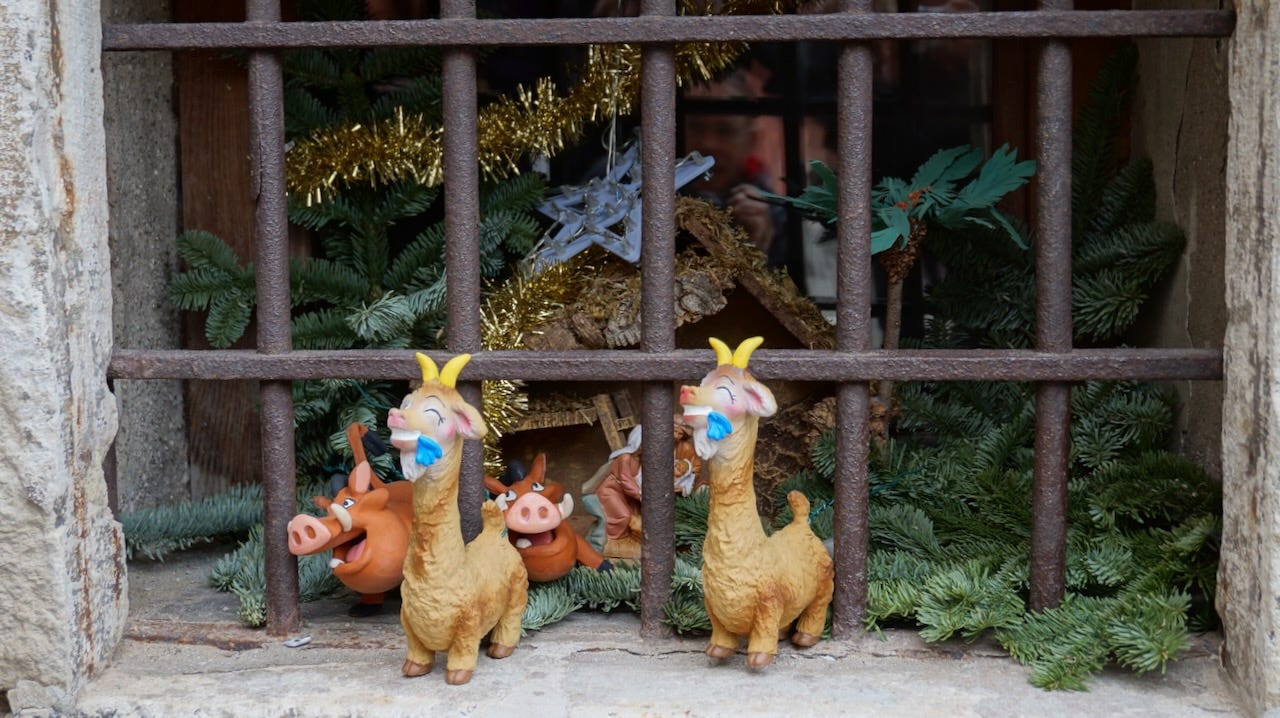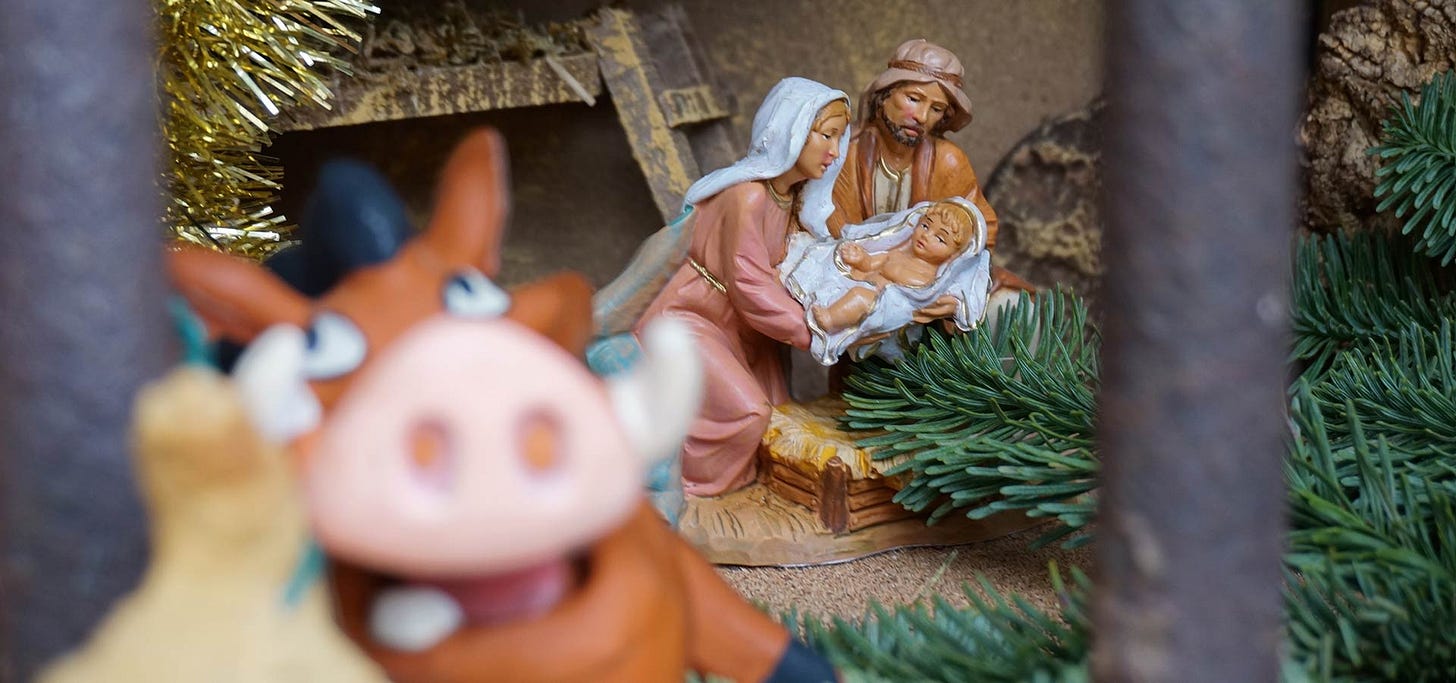Merry Christmas and Hakuna Matata
Don't worry, be faithful.
I love updating this post with fresh insights that God reveals from his word. I encourage you to add Isaiah 49 to your Advent or Christmas reading — it’s an exquisite foretelling about the incarnation. Keep reading, and you’ll understand why.
If you have children or grandchildren or are a Disney fan, you’ve heard this phrase sung by a warthog and a meerkat: Hakuna Matata.
I met an entrepreneur in Zanzibar who always greeted me with “Hakuna Matata.”
Hakuna Matata is a Swahili language phrase from East Africa, meaning “no trouble,” “no worries,” and “take it easy.”
Wouldn’t you like to greet each day with that phrase on your lips?
You can find nativities everywhere in Italy — shops, businesses, and churches. You’ll find them tucked into window wells behind iron bars. You can watch a live Nativity in Assisi.
A few years ago, I wandered the alleys and streets of Venice with my family and a tour group. I was the one who lagged, snapping photos. I’m fascinated with nativities — the table-top (or life-sized) romanticized depictions of the Christmas story.
What I love about this nativity is that a child inserted a toy into the scene. Not any of the traditional animals associated with the Nativity: sheep, an ox, a donkey, or, in many traditions, the Magi’s camels (the Magi probably didn’t show up for a couple of years after Jesus was born).
The Lion King character, Pumba, is caught between the sacred and the secular. It’s the simple offering of a child’s heart, a playful addition to a holy scene, bringing the incarnation to a child’s level.
Isn’t that how we should approach Christmas?
Christ Gave us the Gift of Freedom to Worship Him through Everything, Everywhere, Always
This nativity picture portrays the tension many of us feel as we seek to reconcile work and faith. The Western church’s narrow focus on the spiritual cautions us to keep the earthly aspects of our lives locked behind iron bars.
For many, the church teaches that the believer’s sole purpose and responsibility are functional (make disciples, count the results, repeat). Instead, the Bible teaches us to proclaim God’s full glory and greatness — and the Christ-follower’s unique position in God’s grand story (“God wanted his people throughout the world to know the glorious riches of this mystery — which is Christ living in you, giving you the hope of glory.” – Colossians 1:27 (GOD’S WORD Translation)
Like Christ, God gives us a position, a role, and a purpose: We are his adopted children, called to serve and given the right to “share equally in the riches inherited by God’s children.” (Ephesians 3:6)
God said of Jesus (Matthew 3:13-17), “This is my Son, whom I love.” God named him a servant to restore Israel and had an even greater purpose in mind:
“You are not just my servant
who restores the tribes of Jacob
and brings back those in Israel whom I have preserved.
I have also made you a light for the nations
so that you would save people all over the world.” (Isaiah 49:6)
Jesus tore down the wall that separates people like you and me from a holy God. The false separation between the secular and sacred disappeared when the veil tore.
Every day, we work in a culture filled with commercial interests, where playful (and some not-so-playful) acts of whimsy are frowned upon but desperately needed.
We continue to live in tension because we have not embraced this truth: When Christ redeemed us, he redeemed us completely — the eternal and the physical. He redeemed your mind, body, and spirit.
Christ redeems your vocation.
As Francis Schaeffer stated in Art & The Bible,
"Despite our constant talk about the lordship of Christ, we have narrowed its scope to a very small area of reality. We have misunderstood the concept of the lordship of Christ over the whole man and the whole of the universe and have not taken to us the riches that the Bible gives us for ourselves, for our lives, and for our culture.
The lordship of Christ over the whole of life means that there are no platonic areas in Christianity, no dichotomy or hierarchy between the body and the soul. God made the body as well as the soul, and redemption is for the whole man.”
Philippians reminds us, “Don’t worry about anything, instead, pray about everything. Tell God what you need, and thank him for what he has done.”
Stop living in tension. Pray about everything. Stop worrying that you will do something wrong, and make your faith a living part of your entrepreneurial lifestyle and the foundation of your business.
Find your Pumba and place it before the manager.
Hakuna Matata. Grace covers you.
Merry Christmas, my friends!
St. Francis of Assisi of Italy is credited with creating the first nativity scene. Its design is based on a romanticized interpretation of Scripture.



